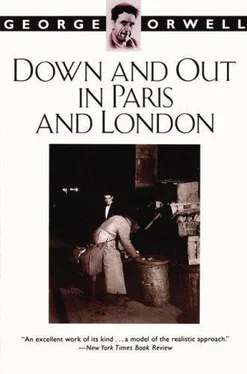George Orwell - Down and Out in Paris and London
Здесь есть возможность читать онлайн «George Orwell - Down and Out in Paris and London» весь текст электронной книги совершенно бесплатно (целиком полную версию без сокращений). В некоторых случаях можно слушать аудио, скачать через торрент в формате fb2 и присутствует краткое содержание. Жанр: Старинная литература, на русском языке. Описание произведения, (предисловие) а так же отзывы посетителей доступны на портале библиотеки ЛибКат.
- Название:Down and Out in Paris and London
- Автор:
- Жанр:
- Год:неизвестен
- ISBN:нет данных
- Рейтинг книги:5 / 5. Голосов: 1
-
Избранное:Добавить в избранное
- Отзывы:
-
Ваша оценка:
- 100
- 1
- 2
- 3
- 4
- 5
Down and Out in Paris and London: краткое содержание, описание и аннотация
Предлагаем к чтению аннотацию, описание, краткое содержание или предисловие (зависит от того, что написал сам автор книги «Down and Out in Paris and London»). Если вы не нашли необходимую информацию о книге — напишите в комментариях, мы постараемся отыскать её.
Down and Out in Paris and London — читать онлайн бесплатно полную книгу (весь текст) целиком
Ниже представлен текст книги, разбитый по страницам. Система сохранения места последней прочитанной страницы, позволяет с удобством читать онлайн бесплатно книгу «Down and Out in Paris and London», без необходимости каждый раз заново искать на чём Вы остановились. Поставьте закладку, и сможете в любой момент перейти на страницу, на которой закончили чтение.
Интервал:
Закладка:
its head stuck in the railings of Chelsea Bridge. Well, I
heard about it, and my cartoon was on the pavement
before they'd got the child's head out of the railings.
Prompt, I am."
Bozo seemed an interesting man, and I was anxious to see
more of him. That evening I went down to the
Embankment to meet him, as he had arranged to take
Paddy and myself to a lodging-house south of the river.
Bozo washed his pictures off the pavement and counted
his takings-it was about sixteen shillings, of which he said
twelve or thirteen would be profit. We
walked down into Lambeth. Bozo limped slowly, with a
queer crablike gait, half sideways, dragging his smashed
foot behind him. He carried a stick in each hand and slung
his box of colours over his shoulder. As we were crossing
the bridge he stopped in one of the alcoves to rest. He fell
silent for a minute or two, and to my surprise I saw that he
was looking at the stars. He touched my arm and pointed
to the sky with his stick.
"Say, will you look at Aldebaran! Look at the colour.
Like a ------------
great blood orange!"
From the way he spoke he might have been an art critic
in a picture gallery. I was astonished. I confessed that I
did not know which Aldebaran was, indeed, I had never
even noticed that the stars were of different colours. Bozo
began to give me some elementary hints on astronomy,
pointing out the chief constellations. He seemed
concerned at my ignorance. I said to him, surprised:
"You seem to know a lot about stars."
"Not a great lot. I know a bit, though. I got two letters
from the Astronomer Royal thanking me for writing about
meteors. Now and again I go out at night and watch for
meteors. The stars are a free show; it don't cost anything
to use your eyes."
"What a good idea! I should never have thought of it."
"Well, you got to take an interest in something. It don't
follow that because a man's on the road he can't think of
anything but tea-and-two-slices."
"But isn't it very hard to take an interest in things-
things like stars-living this life?"
"Screeving, you mean? Not necessarily. It don't need
turn you into a bloody rabbit-that is, not if you set your
mind to it."
"It seems to have that effect on most people."
"Of course. Look at Paddy-a tea-swilling old moocher,
only fit to scrounge for fag-ends. That's the way most of
them go. I despise them. But you don't need to get like that.
If you've got any education, it don't matter to you if
you're on the road for the rest of your life."
"Well, I've found just the contrary," I said. "It seems to
me that when you take a man's money away he's fit for
nothing from that moment."
"No, not necessarily. If you set yourself to it, you can
live the same life, rich or poor. You 'can still keep on with
your books and your ideas. You just got to say to yourself,
'I'm a free man in here' "-he tapped his forehead-"and
you're all right."
Bozo talked further in the same strain, and I listened
with attention. He seemed a very unusual screever, and he
was, moreover, the first person I had heard maintain that
poverty did not matter. I saw a good deal of him during
the next few days, for several times it rained and he could
not work. He told me the history of his life, and it was a
curious one.
The son of a bankrupt bookseller, he had gone to work
as a house-painter at eighteen, and then served three years
in France and India during the war. After the war he had
found a house-painting job in Paris, and had stayed there
several years. France suited him better than England (he
despised the English), and he had been doing well in
Paris, saving money, and engaged to a French girl. One
day the girl was crushed to death under the wheels of an
omnibus. Bozo went on the drink for a week, and then
returned to work, rather shaky; the same morning he fell
from a stage on which he was working, forty feet on to the
pavement, and smashed his right foot to pulp. For some
reason he received only sixty pounds compensation. He
returned to England, spent his money in looking for jobs,
tried hawking books in Middlesex Street market, then
tried selling toys from a tray, and finally settled down as
a screever. He had lived hand to mouth ever since, half
starved throughout the winter, and often sleeping in the
spike or on the Embankment. When I knew him he
owned nothing but the clothes he stood up in, and his
drawing materials and a few books. The clothes were the
usual beggar's rags, but he wore a collar and tie, of
which he was rather proud. The collar, a year or more
old, was constantly "going" round the neck, and Bozo
used to patch it with bits cut from the tail of his shirt so
that the shirt had scarcely any tail left. His damaged leg
was getting worse and would probably have to be
amputated, and his knees, from kneeling on the stones,
had pads of skin on them as thick as boot-soles. There
was, clearly, no future for him but beggary and a death
in the workhouse.
With all this, he had neither fear, nor regret, nor
shame, nor self-pity. He had faced his position, and
made a philosophy for himself. Being a beggar, he said,
was not his fault, and he refused either to have any
compunction about it or to let it trouble him. He was the
enemy of society, and quite ready to take to crime if he
saw a good opportunity. He _ refused on principle to be
thrifty. In the summer he saved nothing, spending his
surplus earnings on drink, as he did not care about
women. If he was penniless when winter came on, then
society must look after him. He was ready to extract
every penny he could from charity, provided that he was
not expected to say thank you for it. He avoided
religious charities, however, for he said that it stuck in
his throat to sing hymns for buns.
He had various other points of honour; for instance, it
was his boast that never in his life, even when starving,
had he picked up a cigarette end. He considered himself
in a class above the ordinary run of beggars, who, he
said, were an abject lot, without even the decency to be
ungrateful.
He spoke French passably, and had read some of Zola's
novels, all Shakespeare's plays, Gulliver's Travels, and a
number of essays. He could describe his adventures in
words that one remembered. For instance, speaking of
funerals, he said to me:
"Have you ever seen a corpse burned? I have, in India.
They put the old chap on the fire, and the next moment I
almost jumped out of my skin, because he'd started
kicking. It was only his muscles contracting in the heat-
still, it give me a turn. Well, he wriggled about for a bit
like a kipper on hot coals, and then his belly blew up and
went off with a bang you could have heard fifty yards
away. It fair put me against cremation."
Or, again, apropos of his accident:
"The doctor says to me, 'You fell on one foot, my man.
And bloody lucky for you you didn't fall on both feet,' he
says. 'Because if you had of fallen on both feet you'd
have shut up like a bloody concertina, and your thigh
bones'd be sticking out of your ears!"
Clearly the phrase was not the doctor's but Bozo's
own. He had a gift for phrases. He had managed to keep
his brain intact and alert, and so nothing could make him
succumb to poverty. He might be ragged and cold, or even
Читать дальшеИнтервал:
Закладка:
Похожие книги на «Down and Out in Paris and London»
Представляем Вашему вниманию похожие книги на «Down and Out in Paris and London» списком для выбора. Мы отобрали схожую по названию и смыслу литературу в надежде предоставить читателям больше вариантов отыскать новые, интересные, ещё непрочитанные произведения.
Обсуждение, отзывы о книге «Down and Out in Paris and London» и просто собственные мнения читателей. Оставьте ваши комментарии, напишите, что Вы думаете о произведении, его смысле или главных героях. Укажите что конкретно понравилось, а что нет, и почему Вы так считаете.












